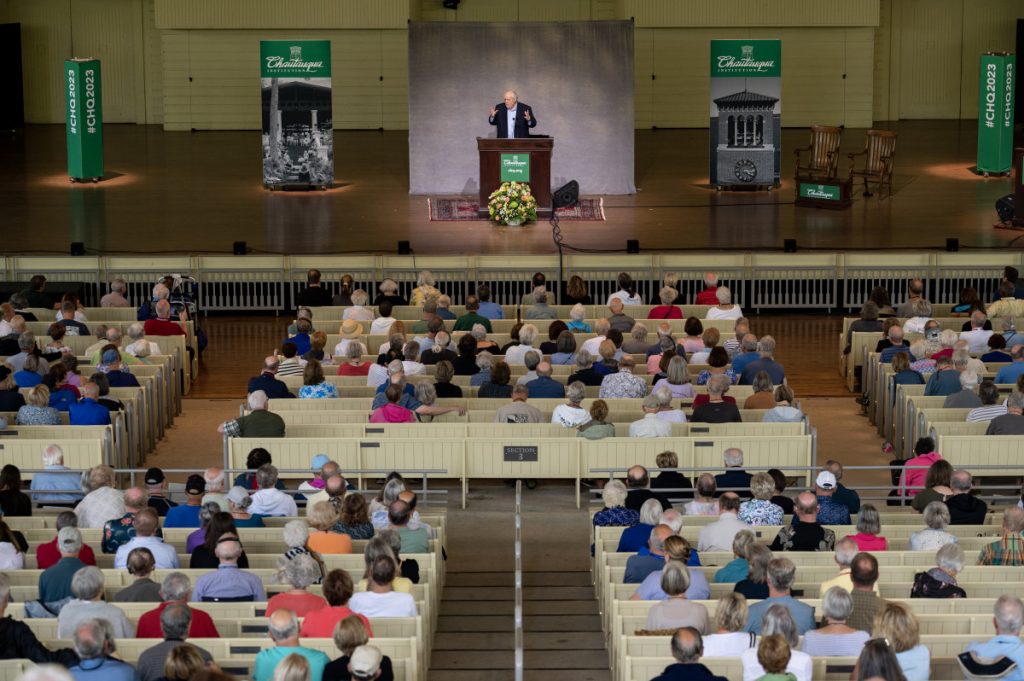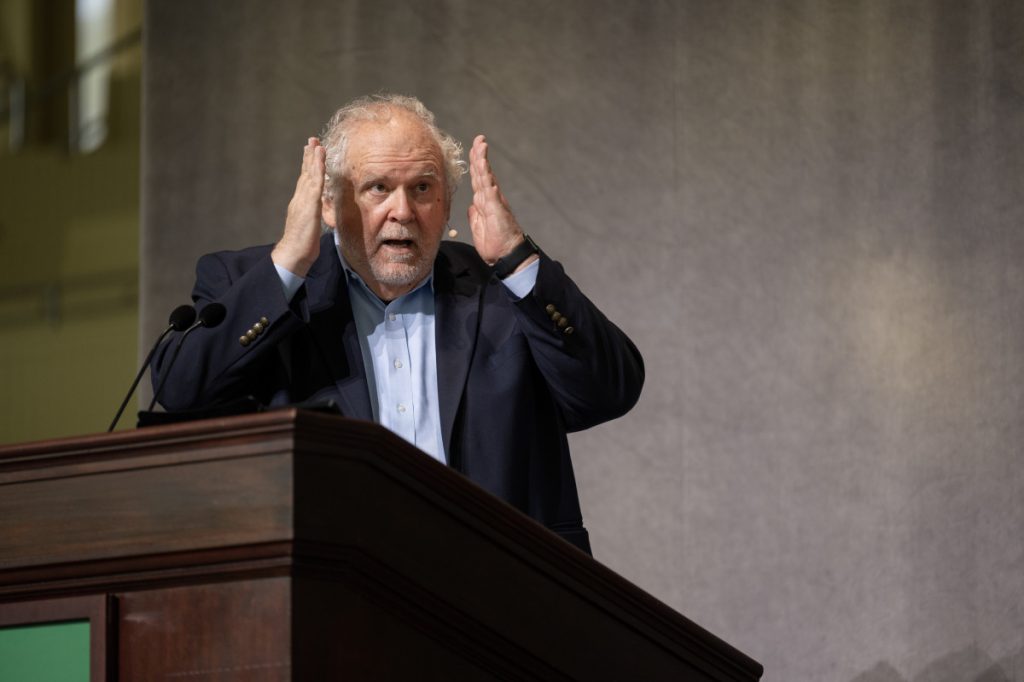
Alton Northup
Staff writer
Political divisions in the United States, while deep, are not the cause of modern societal chaos, argued Walter Russell Mead.
“I believe we are living in a time of near-revolutionary transformation and upheaval, comparable to the Industrial Revolution and perhaps greater than that revolution in scale and scope,” he said.
Mead, who serves as the James Clarke Chance Professor of Foreign Affairs and Humanities at Bard College and the Ravenal B. Curry III Distinguished Fellow in Strategy and Statesmanship at Hudson Institute, discussed the rise of the Information Revolution and its implications for American society at 10:45 a.m. Thursday in the Amphitheater, bringing his perspective to the Chautauqua Lecture Series Week Three theme, “Can the Center Hold? – A Question for Our Moment.”
The Industrial Revolution radically changed society. It saw the rise of novel political systems, powerful methods of war, destruction of the environment, class struggles and the creation of the modern city. It fundamentally changed the way humans live, Mead said, and the Information Revolution will be no different.
“It will challenge our institutions, our culture, our international relations and everything else as profoundly, if not more so, than the Industrial Revolution,” he said. “It’s happening faster, and I think ultimately the changes it will bring about will be deeper and farther reaching.”

Many of the challenges of the 19th and 20th centuries are still relevant. As the United States “confronts the storm of the Information Revolution,” particularly the rapid development of technology, it can look to its ability to embrace the changes of the Industrial Revolution while remaining connected to its cultural roots.
As during the Industrial Revolution, the jobs people expected to have are now disappearing as they scramble to adjust to a change they did not want. Manufacturing and clerical work account for less than 20% of the American workforce, Mead said, compared to nearly 50% in the 1970s. This rate of decline, he said, is equal to the decline of farming during the Industrial Revolution.
A greater threat to Americans’ traditional way of life, he argued, is fallout from the COVID-19 pandemic. Now that companies discovered 50% of the population could stay home and the economy will still work, “the form of the industrial age city – that downtown, that vast conglomerate of people around so many of our political and economic institutions – is no longer necessary.”
Urban civilization faces a rapid decay threatening its tax structure, educational institutions and infrastructure, Mead said.
“It creates a level of dissatisfaction in society and instability that affects our politics and culture in all kinds of ways that are hard to measure,” he said.
He compared the current era to the period between President Abraham Lincoln’s assassination in 1865 and President William McKinley’s assassination in 1901, a time when large cities developed rapidly across the Plains amid a “great crisis of American ideology” in the shadow of reconstruction, policy failures and scandals.
Mead is hesitant to say society is near the end of that crisis – in fact, it might get worse – but there is the potential for new ideologies to emerge. Our current conception of the center is linked to the Progressive movement and upper-middle class reformers that came out of the Industrial Revolution, he said.
The general idea behind the Progressive movement was the conflict in an industrial society between the plutocrats, people of great wealth; and the proletariat, or working-class people. Reformers argued that if left unchecked, the plutocrats would wreck society with their greed. Likewise, the proletariat posed a threat to the order of society as uneducated rural farmers moved into urban centers for work.
Upper-middle class citizens wanted to lift the proletariat up through public education and regulate their behavior through policies such as Prohibition, while they pruned back plutocrats to avoid a power crisis that could lead to revolution.
“The hope was to sort of do better governance, take politics out of government and replace it with administrative governance by credentialed experts,” Mead said.
That structure worked. And it worked so well, he said, many think it is the only way society can work. But what was right for an advanced industrial society might not fit an early information society.
Plutocrats, he argued, have lost patience with the restraints imposed by economic regulations as American businesses scramble faster against international competition.
The proletariat has become less deferential. In the early 1900s, the working class was largely composed of first-generation Americans who relied on teachers, not their parents, to teach them about society and its values. As these families assimilated, this reliance on institutional figures dissipated and now “the mass of American society no longer wants experts telling it what to do – even, perhaps, in those cases where they would be wiser to listen to those experts,” Mead said.
Americans have also developed a largely individualistic society. As Americans enter the Information Age, people have linked their identities to what they consume rather than their careers, as work became repetitive and unfulfilling. And coupled with the automation and offshoring of industrial jobs, a once-powerful voter class that could single-handedly affect the economy is fading.
“The industrial working class was a different thing,” he said. “… The industrial working class as an entity that can kind of bring the country to a halt no longer exists, and instead our politics is kind of more around identity groups and smaller interest groups.”
It is difficult for the vital center to work without the gravity of working class interests in politics, Mead argued. And the fragility of this center, he said, will only get worse as novel problems fluster experts.
In the 1960s, experts were convinced they could not just predict but control the stock market. The dot-com bubble, 2000s housing bubble and the following Great Recession have proved them wrong.
Additionally, climate change will remain a consequential problem in the decades to come. And while the issue should not be politicized, Mead said, it is almost impossible for such a far-reaching, complex topic to avoid debate in Washington.
So where does this leave a place such as Chautauqua, full of people who believe public service and diligent thinking matters? Mead urged Chautauquans to answer the call of Abraham, urging them to venture into new lands of thought.
“This is not the time for us to cling to the certainties of the last 100 years,” he said.




